You may also be interested in
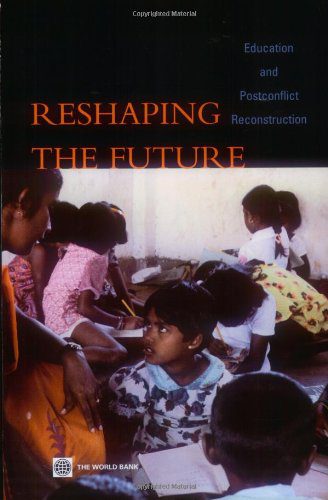
Reshaping the Future: Education and Postconflict Reconstruction
The text explores the vital role of education in post-conflict reconstruction efforts, highlighting its transformative potential in reshaping societies and fostering sustainable peace and development.
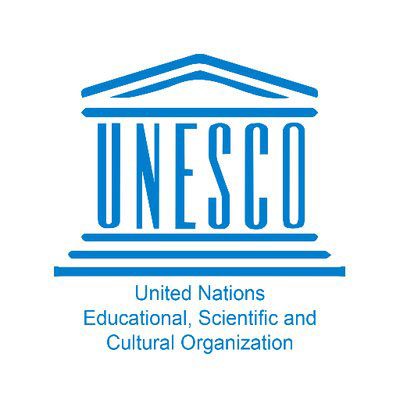
Education Counts: Towards the UN Development Goals
The text discusses the importance of education in achieving the UN Development Goals. It highlights the critical role education plays in economic growth, reducing poverty, improving health outcomes, and promoting gender equality. By investing in education, countries can address various societal challenges and work towards sustainable development.

World Bank Symposium: Assessment for Global Learning
This session highlighted the need for a clear vision and strategy on the part of the international development community if we are to overcome the global “learning crisis”. This vision must place learning at the core of the post-2015 development agenda – as a tool that contributes to personal, social, and economic development. Many developing countries currently lack the vision and leadership required to overcome the learning crisis. If action is not taken, the situation will only worsen.
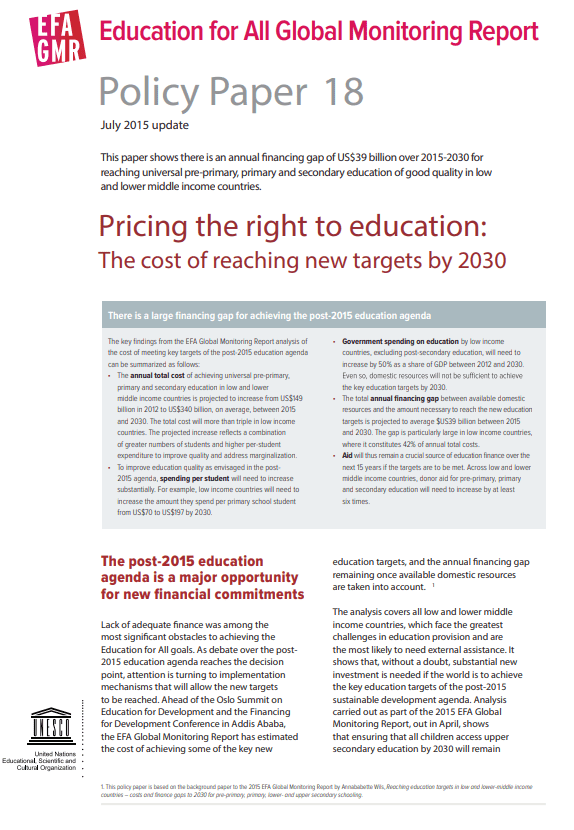
Pricing the right to education: The cost of reaching new targets by 2030
This paper shows there is an annual nancing gap of US$39 billion over 2015-2030 for reaching universal pre-primary, primary and secondary education of good quality in low and lower middle income countries.
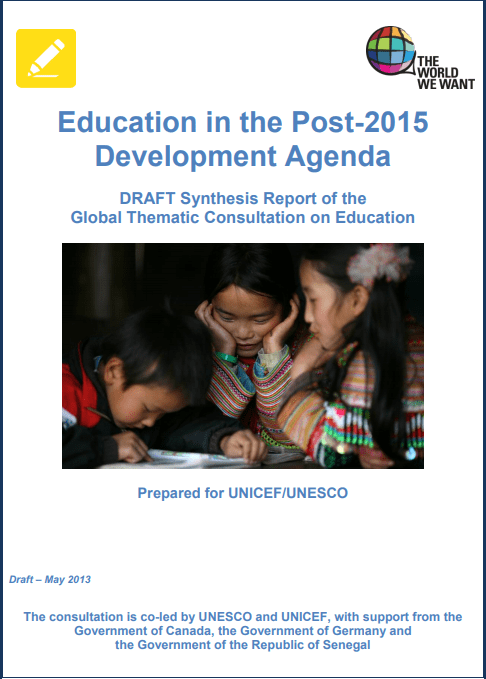
Making Education a Priority in the Post-2015 Development Agenda
The post-2015 development agenda should prioritize education to address global challenges effectively and promote sustainable development. Educational goals must encompass quality, inclusivity, equity, and lifelong learning opportunities for all individuals, regardless of background. Investing in education not only benefits individuals by improving their opportunities and well-being but also contributes to societal advancement by fostering economic growth, reducing poverty, and promoting social cohesion. Education is a fundamental human right and a key driver of progress, making it essential f...
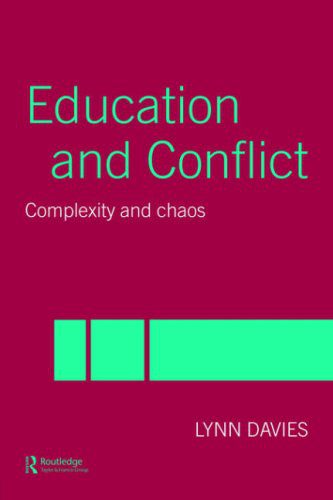
Education and Conflict: Complexity and Chaos
The relationship between education and conflict is intricate and tumultuous. Factors such as historical influence, societal norms, and educational policies all contribute to this complex dynamic. Conflicts can disrupt education systems and vice versa, leading to a chaotic environment where the role of education in promoting peace and reconciliation becomes crucial. Understanding this complexity is essential for addressing conflicts and creating sustainable peace-building efforts.

Oslo Summit: Financing Education in Developing Countries
The Oslo Summit focuses on financing education in developing countries to ensure access and quality education for all children.
The international dimension in national higher education policies: What has changed in Europe in the last five years?
The text discusses changes in European higher education policies over the last five years with a focus on the international dimension.
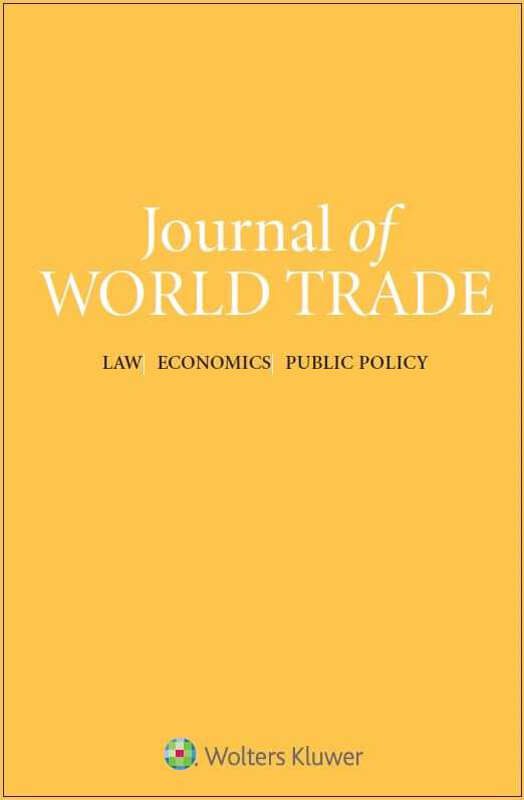
Rethinking trade in education services: A wake-up call for trade negotiators
Education plays a crucial role in fostering personal and social development, as well as economic growth. Government policies play a dominant role in this sector. Over time, trade in education services, particularly at the tertiary level, have been growing in importance. Driving factors include a combination of demographic changes, technological developments, national development goals, and governmental reforms to the funding and provision of higher education. The educational market has grown in size with more exporters entering the field to satisfy growing demand worldwide. The education ...
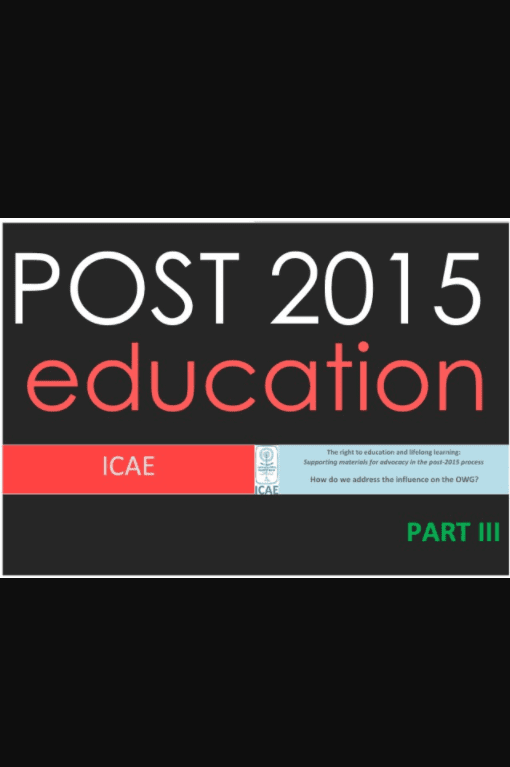
Post-2015 Education Part III: How do we address the influence on the OWG?
The message provides insight into addressing the influence on the OWG concerning post-2015 education.
The Education Millennium Development Goal Beyond 2015: Prospect for Quality and Learners
The text is about discussing the Education Millennium Development Goal post-2015 with a focus on quality and learners.
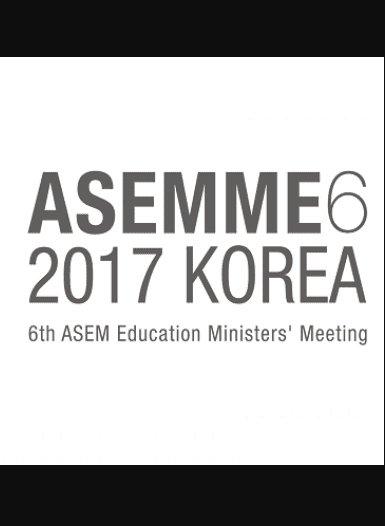
ASEAN Education Ministers Meeting (ASED)
Summary: The message will provide information related to the upcoming ASEAN Education Ministers Meeting (ASED).

E-learning at Fiji National University
In this paper, Fiji National University (FNU) was used to determine the possibility of e-learning. A new programme was chosen and a programme document was written. Based on the programme, a unit syllabus was developed. Given the infrastructure of the information and communication technology (ICT) department at FNU, this project will be deployed as a pilot project for evaluation and monitoring of e-learning research.
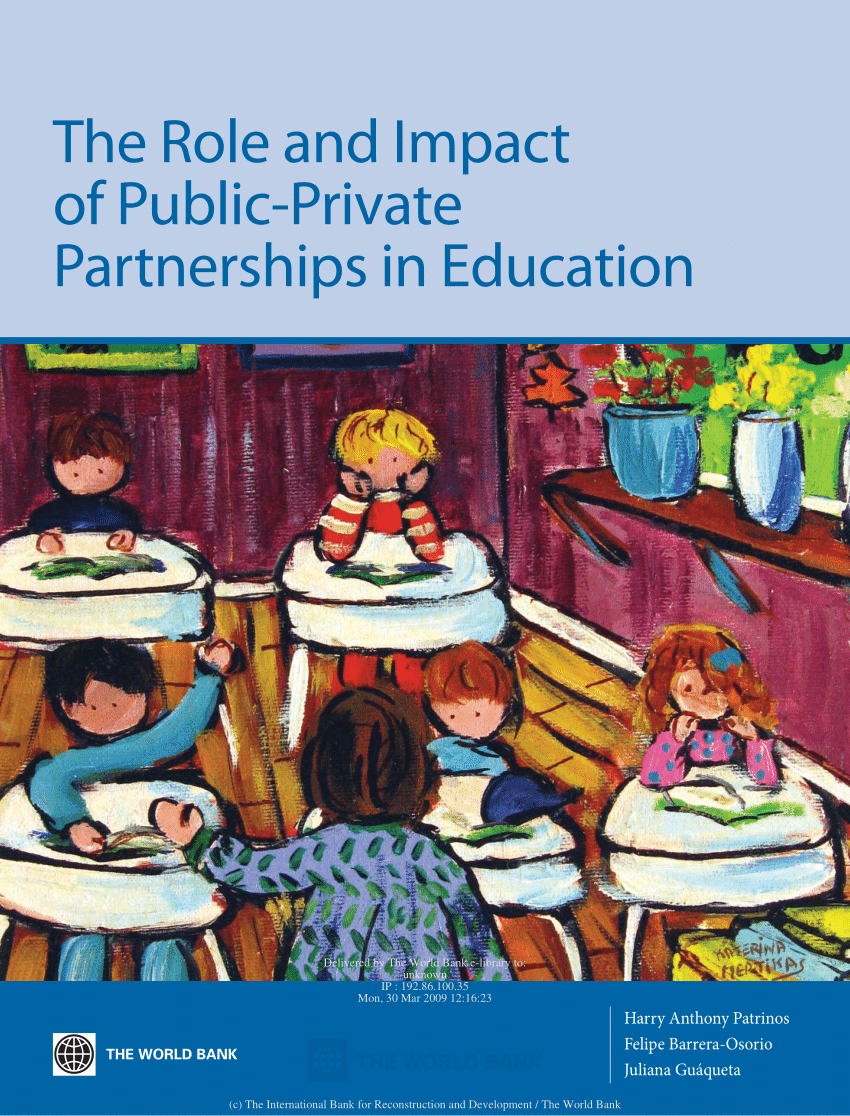
The Role and Impact of Public-Private Partnerships in Education
The article discusses the significance of public-private partnerships in education. These partnerships bring together government resources and private sector expertise to enhance educational initiatives. By combining forces, they can address common challenges, improve access to quality education, and foster innovation in educational practices. Public-private partnerships play a vital role in expanding educational opportunities and improving outcomes for students globally.
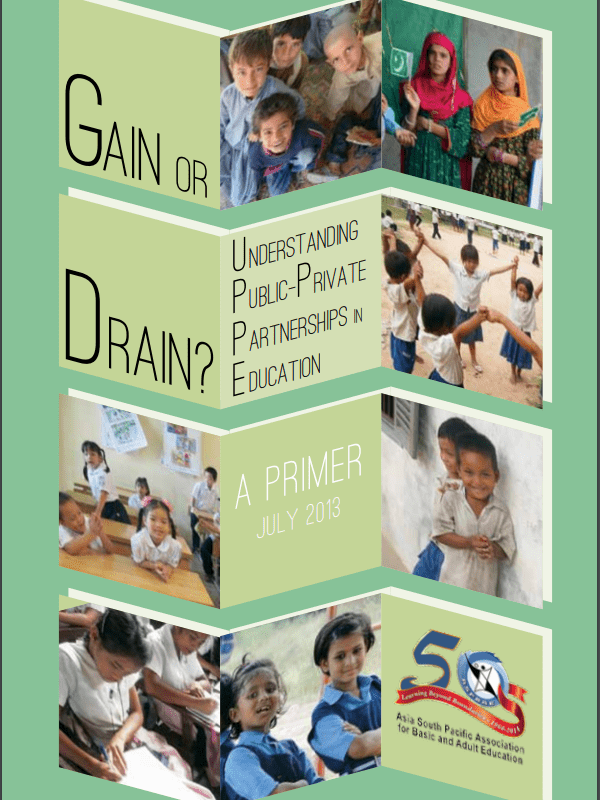
Gain or Drain? Understanding Public-Private Partnerships in Education
The article discusses the potential benefits and drawbacks of public-private partnerships in education, highlighting the need to understand their impact on students, teachers, and stakeholders.

Enyclopedia of International Development
The Encyclopedia of International Development is a comprehensive resource that covers a wide range of topics related to development, including theories, practices, actors, and key issues. It offers insights from various disciplines and perspectives, making it an invaluable tool for researchers, policymakers, and practitioners in the field of international development.
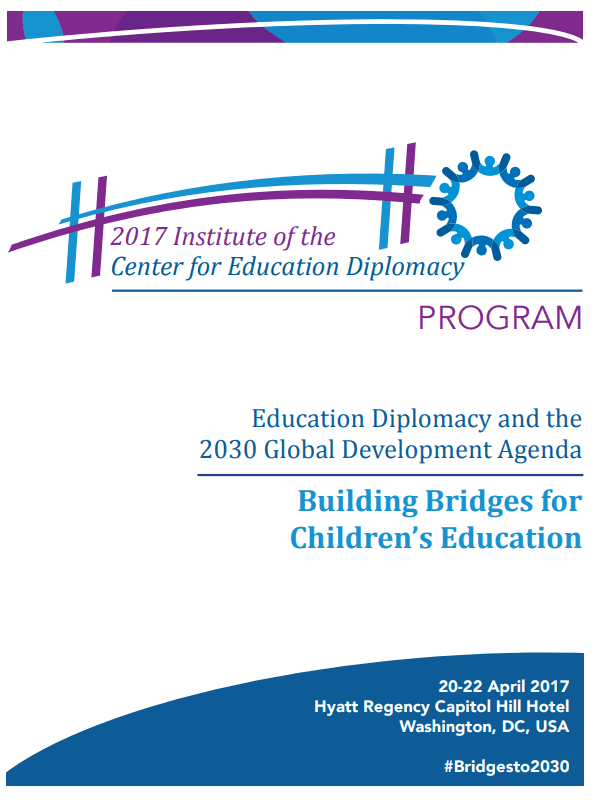
Education Diplomacy Briefs
The Education Diplomacy Briefs focus on global education issues, emphasizing diplomacy for education policy discussions. It highlights the importance of education in achieving sustainable development goals and the role of diplomatic efforts in shaping education policies worldwide.
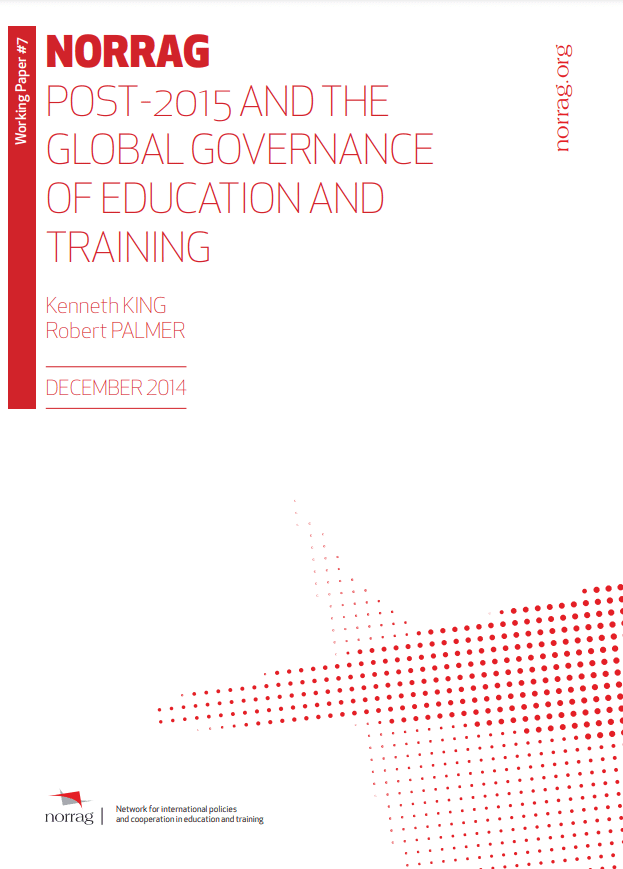
Post-2015 and the Global Governance of Education and Training
The text discusses the importance of post-2015 global governance in education and training. It emphasizes the need for a comprehensive and inclusive framework that addresses the challenges and opportunities in education worldwide. The focus is on creating policies that promote equity, quality, and relevance in education to meet the demands of the 21st century.

Marrying education with ICT
‘It is necessary to ensure the responsible use of technology and to stress the innovation and knowledge sharing that technology allows over the opportunity for piracy, slander, and other ‘negative’ activities’ - Arlene Buckmire-Outram from Grenada
The latest from Diplo and GIP
Tailor your subscription to your interests, from updates on the dynamic world of digital diplomacy to the latest trends in AI.
Subscribe to more Diplo and Geneva Internet Platform newsletters!
Diplo: Effective and inclusive diplomacy
Diplo is a non-profit foundation established by the governments of Malta and Switzerland. Diplo works to increase the role of small and developing states, and to improve global governance and international policy development.


